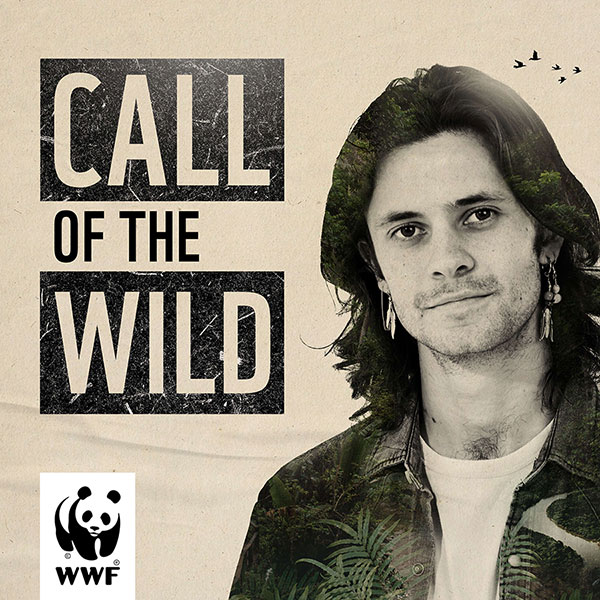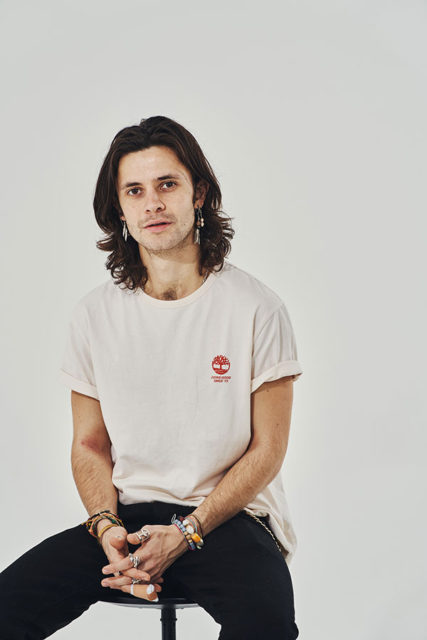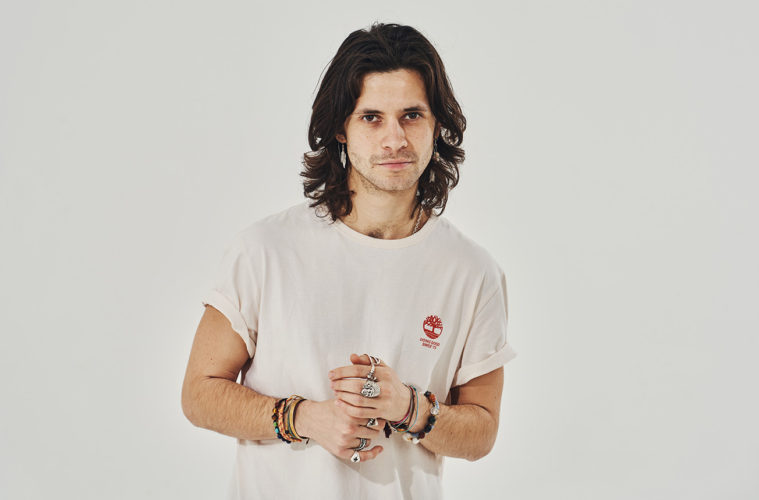Cel Spellman is a hugely successful actor appearing on our screens in programmes such as White Lines (Netflix), Cold Feet (ITV), and Waterloo Road (BBC). Spellman’s talent isn’t just limited to acting. As an ambassador for WWF he has just launched a new podcast entitled Call of the Wild, where he discusses the impact of Climate Change with top environmental experts. Episode one features none other than Sir David Attenborough – together they talk about the devastating effects humans are having on Earth, and what we can do to help save our planet before it’s too late. I caught up with Cel Spellman to talk about his podcast, climate change, turning things around, and how meeting his hero Sir David Attenborough was something he will never forget…
Cel Spellman Interview by Ben Farrin
Hey Cel, can we start by talking about your involvement with WWF – you’re an ambassador for them, right, how did this come about?
I’ve always had that love and passion for the environment growing up, particularly around wildlife and the great outdoors. I remember always having some sort of adoption pack when I was growing up. As I got a bit older and began learning about Climate Change (global warming when I was in school) and the impact we are having on our planet and resources, I felt more and more compelled to help and try do something about it. It was either that or bury my head in the sand. Around aged 15 when I was working for the BBC in children’s TV, I reached out to WWF. I said you probably won’t know who I am but I work quite closely with young people and if there’s anyway I can support your work and help a bit, then I’m here. 10 years on I’m a proud ambassador and have just launched a brand new podcast with them – Call of the Wild!

We are experiencing a climate crisis and for us to make the change we need to see, it’s going to require everyone getting involved. For me, education, storytelling, conversation and awareness are some of the key components that will help us readdress our relationship with the natural world and help reverse the effects of Climate Change. That, combined with the massive rise of the podcast as a medium make it a perfect fit for what we are trying to do with opening up the conversation around environmental issues. Each episode we’re going to talk to a different famous face, someone experiencing the impacts of Climate Change and top environmental experts to learn about a different area of the environmental conversation from deforestation, to fast fashion, to plastic in the oceans. I hope people get some tangible things they can implement in their everyday lives and come away armed with some facts and more of an understanding about what’s happening with our planet, while at the same time feel hopeful we can turn things around and make that change that we need to see sooner rather than later.
It’s amazing to see you helping raise awareness of such important issues, and to feature Sir David Attenborough as your first guest, WOW! What was it like meeting your hero, who I consider as being one of the best people on the planet?
I completely agree, he really is one of the best. I can wholeheartedly say he’s everything you want him to be and more. That clichéd thing of ‘do not meet your heroes’, does not apply here; he’s absolutely one you should meet. In fact, he’s even better in person. It feels surreal it happened but it was an opportunity I felt so lucky to get. To say he is 94, he was so kind, present, generous and made everyone feel at ease. When he started talking, we all know the power of his voice but through his energy too, you’re transfixed, hanging off his every word. It was a dream come true and it’s something I’ll never forget.
You discuss a lot of the alarming environmental issues including the devastating effect climate change is having on planet Earth. Sir David Attenborough in his own words explains how by “damaging the natural world, we are damaging ourselves”, and “we have been doing that, without care, for decades”. Is there still time to turn things around before the impacts of climate change on our planet are irreversible?
Yes 100%. Scientists say we may have as little as 8 years left to reverse the effects of climate change and repair our relationship with the natural world. All the systems and tools we need to make that change are available to us, it’s all out there. What it’s going to require is us putting it at the forefront of our thinking, lifestyles and legislation. We absolutely can turn things around. We all have a duty and responsibility to be accountable for our actions and be more thoughtful in our decisions but it also requires the same mass commitment and action from governments, politicians and big decision makers to accept that there is a climate crisis and to implement the things they have the power to implement to create that systemic change we and the planet need to see. Between governments and individual action, the space for us to turn things around is every much there but it’s now or never.
Why do you think we have continued to damage our planet without enough previous attempts to solve these saddening and devastating issues – why in your opinion, is not enough being done already to save our natural world in the battle against climate change?
First and foremost, it feels like we’d not fully accepted the climate crisis. If it was taken as seriously as it should’ve been, if we were aware of the facts and truth of the matter, if people realised the severity of the situation, I believe a lot more would have been done sooner. Throw that into a time when we aren’t as thoughtful in our actions, where we are ignorant to things that don’t directly affect us, where we don’t care about the planet or the impact we were having on it. One of the best examples of this is Blue Planet II. It took Blue Planet II to highlight and show us the scale of the plastic crisis and in turn motivated us to do something about it. Until then we were throwing away plastic like it was nothing, without a thought in the world. We live in a time of consumerism and throw away culture, these are ways of living that aren’t sustainable and we need to change this to have a positive impact on our environment. In a world of social media we’re also able to access a lot more information and share stories of tragic things happening in our natural world, so we’re now all more aware and that awareness is key to reversing some of the damage we’ve done. At the heart of it, there’s been a big disconnect from nature to the point where we go about our day to day at the expense of our planet and its resources. If we continue to do this and operate in this way, nothing’s going to change. It’s why we haven’t seen the change we need to see. But in every decision we make, if we start thinking about how that’s going to impact our planet and environment, if we start appreciating our natural world in a way we haven’t and if we re-connect with nature, we will be able to fix things.
What small things can people do in their day-to-day lives to help tackle this global issue in the fight to save our planet?
Reconnecting with nature straight away! Getting back in the wild and enjoying wild, green spaces are so important. On the podcast, David Attenborough says this is one of the biggest things we can do to repair our relationship in with the natural world. Go out into nature, sit for 10 minutes, don’t move, just listen. Reconnecting with nature will allows us to be more conscious and thoughtful of our impact on the natural world which is fundamental to seeing change. Then, if you can, look to incorporate a more plant-based diet in the food you eat. This is one of the single biggest things you can do to reduce your impact on the environment. If not plant-based then maybe trying to eat more seasonal. Then, money talks. Look at where you’re spending your money and if it’s going to companies that are working with or against the environment. Businesses respond to consumer demand. If, for example, we stopped buying products that used Palm Oil, if we stopped using companies that invested in fossil fuels, if we moved away from fast fashion, businesses would then stop doing it and have to change. Use your voice, write to your local MP and sign petitions on websites such as Change.org and petition.parliament.uk. Finally there’s lots of smaller changes you can make, like cutting down on single use plastic, looking at your travel, looking at if your energy is coming from renewable sources or not, see if there are any re-wilding or tree planting projects around you or in your local area. We’re not all going to be the next Greta Thunberg but we can all do more than we currently are.

Credit: Jane Stockdale
What lifestyle changes have you personally made to do your bit for climate change?
I adopt more of a plant-based diet now. I actually recently changed energy suppliers so mine is 100% renewable. It only took an hour or two! I’m more conscious of my travel in work and personal life, I write to my MP, take to the streets to support and stand up for causes I believe in like the school Climate strike. Call out those that aren’t acting responsibility. And perhaps most importantly is driving conversations through the work that I do with WWF and elsewhere.
What about the big corporates and governments, what can be done in your opinion, on a larger scale to try and turn things around against the fight for our planet’s survival, during the biggest environmental challenge we have ever seen?
They can start putting the planet before profit. Ultimately that’s what it all comes down to. Then staying true to the Paris Climate Agreement and the things that have already been put in place and agreed. It’s a great starting point, but I don’t think it goes far enough, so we need to be looking for more from our politicians and decision makers to realise they have potential to implement a mass systemic change which in turn will have a knock on effect to us. When we put profit first, it will always come at the expense of the planet. For example, the UK plan to ban the sales of petrol and diesel cars by 2030. It’s a good start, don’t get me wrong, but for me, this needs to happen sooner. Big companies need to look at the food chain at things like Palm Oil which are directly linked back to deforestation. It’s about finding the clinks in the chain and saying ‘we need to stop funding that’ or ‘lets remove that and find something more sustainable’. The fashion industry is another that has to have a big change up. Companies often greenwash their policies and products so we’re led to believe they’re more environmentally friendly than they are. But governments and decision makers have to start holding big businesses and banks to account if they’re not meeting standards and regulations they’ve imposed, as should we. You shouldn’t be able to get away with things when it comes to the planet. And ultimately, as I said before, money talks. We still very much have the power, as the consumer, to show these big corporates and business what we’re happy with and what we’re not. And don’t underestimate the power we all have as an individual to raise our voices and stand up for what we believe in. Write to your MP. Vote. Sign those petitions. Let your voices be heard. Don’t forget politicians, governments, big corporates are there to serve YOU.
What one single thing in life are you most grateful for?
With the last year of lockdown, I, like many other people I’m sure have become more grateful for our outdoor spaces than ever before. While we’re not able to meet friends or go out to a restaurant, going for a long walk is the thing that’s kept us all sane and for me, perhaps even hugging a tree. I hope we keep that appreciation in a post-lockdown world. I also can’t not mention my friends and family. Oh and also personal, human connection. I’ve missed that. Very aware thats definitely more than one single thing. Sorry.
As someone who is a very successful actor, an ambassador for WWF and now making a significant difference through your podcast, Call of the Wild, what advice would you offer to anyone out there who wants to be successful in whatever industry that might be?
First of all, David Attenborough says it in the podcast; find that thing that you love, your passion, whatever makes you tick, and follow that. Don’t let anyone or anything let you deviate you from following your heart and going after dreams. Then off that, commitment, hard work and belief are instrumental in getting you to do what it is you set out to do. Then don’t take no for an answer. You can do and be whatever you want and set your mind too, the potential you have has no bounds and really is limitless.
Like you took the opportunity to thank Sir David on your podcast, I’d like to take this moment to thank you Cel, because I am a person who cares immensely about our planet, nature and wildlife. I find it frustrating and extremely sad to see the damage us humans are doing to our planet (and ourselves), and the effects of climate change, so thank you for dedicating your time and energy on making a difference, I’m personally extremely thankful to people like you! One day I hope to meet you in person to share your story in greater detail.
Well that is one of the nicest things you could say to me and it means a great deal. It really is very kind of you to say and I greatly appreciate your words, message and interview. Thank you. I was very touched and moved when I read this final question. I really enjoyed answering your questions and you’re just as much as a part of this as I am, so thank you for your time, work, passion and help in bringing about the change you and I, and no doubt lots of other people want to see. Keep on the road you’re on. Follow your dreams, trust your heart and together we can, and absolutely will, change the world. I too hope we can meet in person soon and put the world to right over a cup of a tea. Peace and love x
Listen to Call of the Wild with Cel Spellman and WWF on Apple, Spotify and all podcast providers.
Are you an aspiring writer interested in helping to raise awareness about climate change? Why not become a Student Pocket Guide contributor and submit your content to us?





